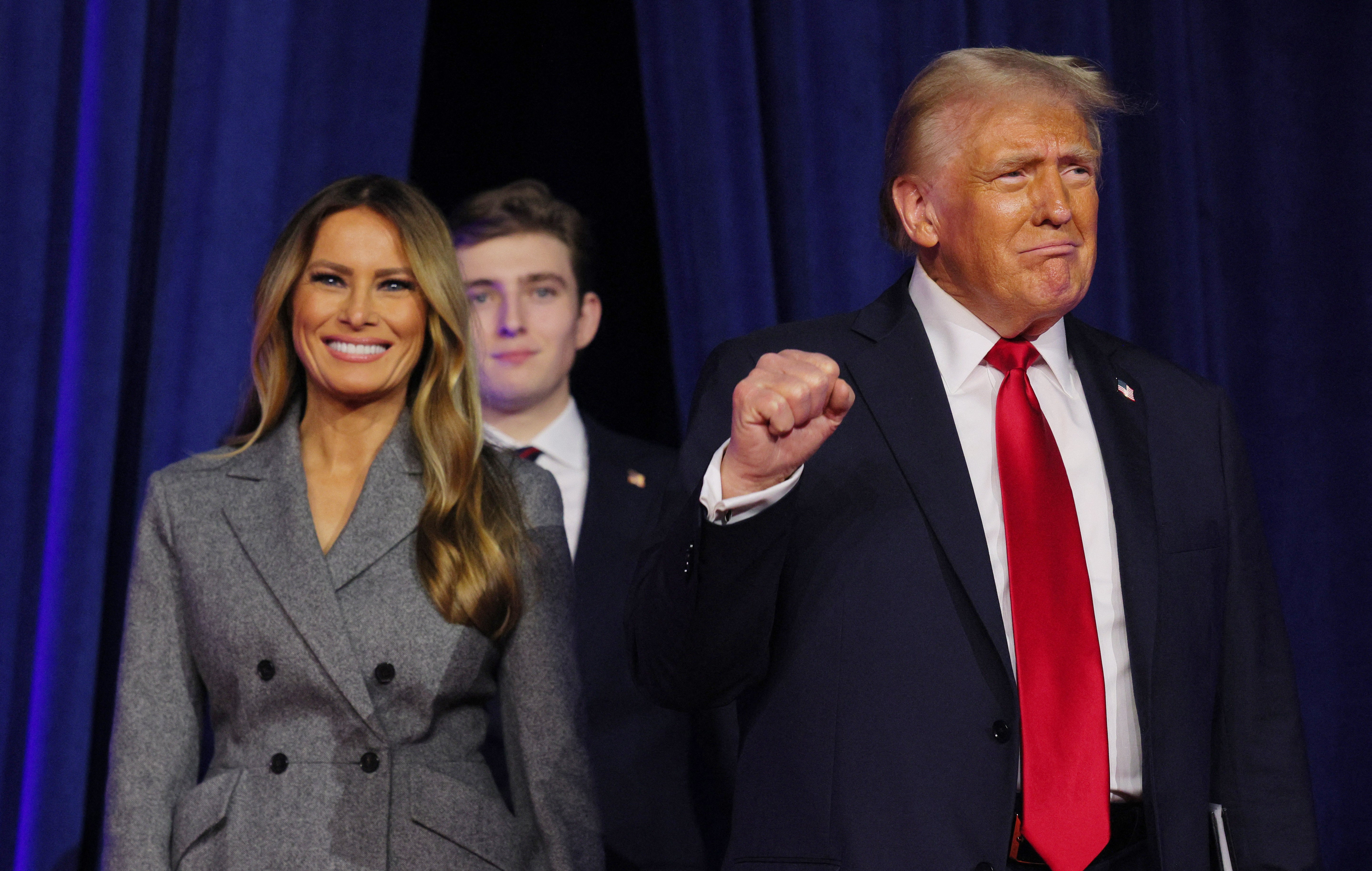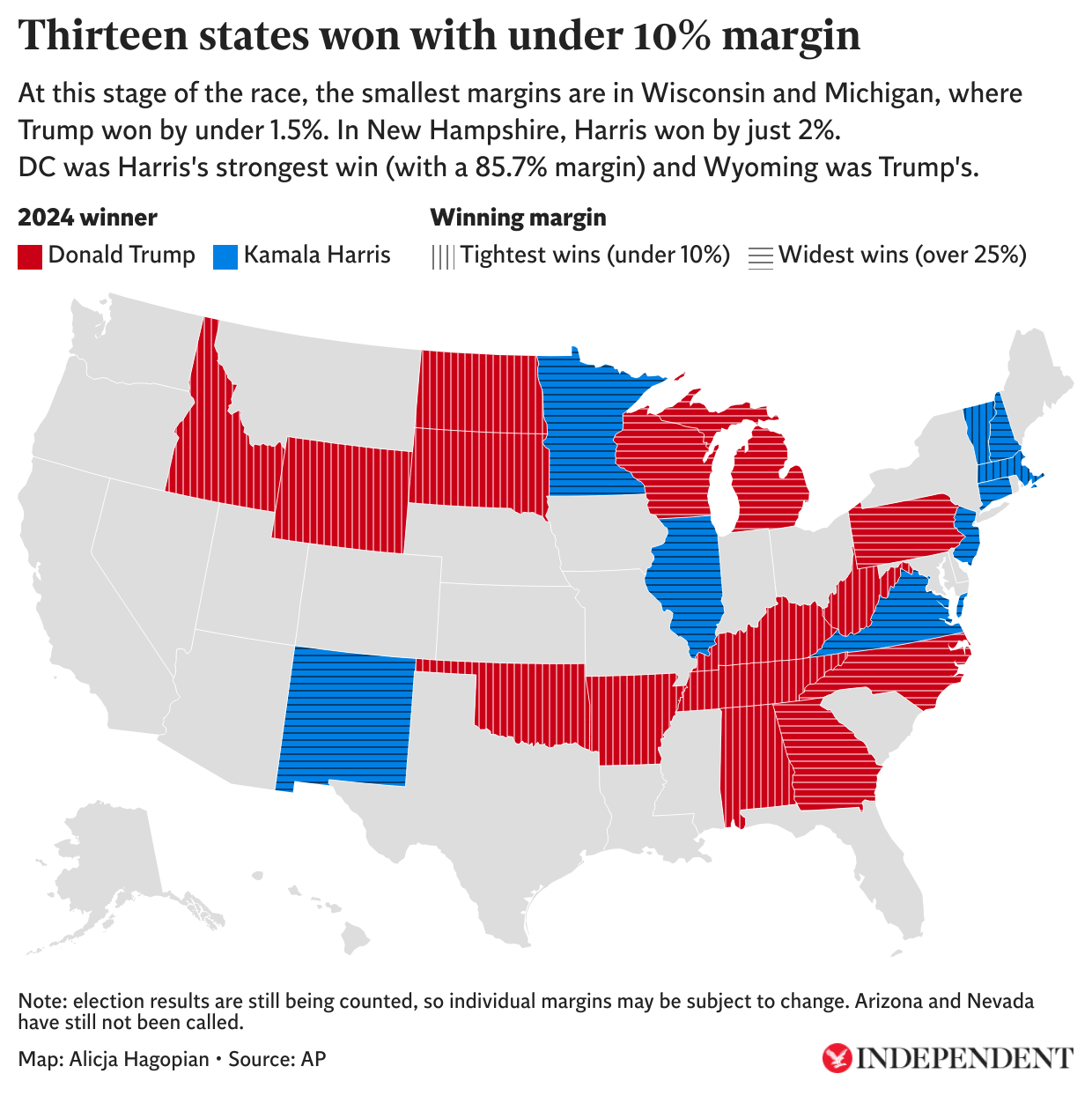Trump claims he has an ‘unprecedented’ mandate. Experts say it’s actually very small
Trump doesn’t have the mandate he thinks he does, presidential historians tell Richard Hall — and Democrats should stop acting like he does

Your support helps us to tell the story
From reproductive rights to climate change to Big Tech, The Independent is on the ground when the story is developing. Whether it's investigating the financials of Elon Musk's pro-Trump PAC or producing our latest documentary, 'The A Word', which shines a light on the American women fighting for reproductive rights, we know how important it is to parse out the facts from the messaging.
At such a critical moment in US history, we need reporters on the ground. Your donation allows us to keep sending journalists to speak to both sides of the story.
The Independent is trusted by Americans across the entire political spectrum. And unlike many other quality news outlets, we choose not to lock Americans out of our reporting and analysis with paywalls. We believe quality journalism should be available to everyone, paid for by those who can afford it.
Your support makes all the difference.As the votes were tallied and the Electoral College map turned red, Donald Trump declared to supporters at his election night victory party that the American people had given him “an unprecedented and powerful mandate.” A wave of cabinet nominations consisting of MAGA loyalists and fringe figures in the days that followed showed he really believed it. There was to be no reaching across the aisle.
But Trump’s margin of victory, historically speaking, is very small. Although he may have won handily in the Electoral College by 312 to 226, he is estimated to win the popular vote by around 1.6 percent. That puts him in 16th place among post-Second World War presidential victories, just behind Jimmy Carter, but ahead of his 2016 performance when he lost the popular vote but still won the keys to the White House.
Trump can claim the title of being the first Republican to win the popular vote in 20 years — but that says more about the quirks of the Electoral College and the popularity of Republicans than it does about the man himself.
So can the President-elect really claim to have an “unprecedented” mandate for change?
“I’m not sure that other presidents would read that as a mandate, but Donald Trump is a different case,” said Mark Updegrove, a presidential historian and CEO of the LBJ Foundation. “Whether Trump has a mandate or not doesn’t matter. He’s going to tell you he has a mandate because he wants to do what he wants to do. He would exploit any advantage.”
It wasn’t always this way. Updegrove noted a contrast between Trump and John F Kennedy, who proceeded with caution following his very close win in the 1960 election.
“[Kennedy] was very wary not to do anything that might look liberal or too partisan-oriented after he just barely squeaked by in the Electoral College,” he said.
Only two other post-war presidents have raised the notion of their mandate in their election victory speeches.
Lyndon Johnson, who won the popular vote by a whopping 22.58 percent in 1964, said that he had been given “a mandate for unity, for a government that serves no special interest, no business government, no labor government, no farm government, no one faction, no one group, but a government that is the servant of all the people.”

Joe Biden, with his 4.45 percent margin of victory in 2020, said he believed he had been given a mandate to “marshal the forces of decency, the forces of fairness.”
But presidents have historically used real mandates to bring about revolutionary changes. Thomas Whalen, an author and presidential historian at Boston University, said Trump’s claim of an unprecedented mandate was “laughable” when compared to landslides won by Ronald Reagan and Johnson.
“Johnson’s victory against Barry Goldwater in 1964 was a historic landslide, and the Democrats had huge gains in the House and Senate,” Whalen said. “It allowed the Great Society to sail through the next two years. That’s how we got Medicare and Medicaid, federal funding for education, PBS — a whole litany of things.”
Whalen said that Trump’s tendency to inflate the size of his successes, and make the most of what he is given, is what makes him unique.
“He’s able to make chicken salad with chicken you-know-what. And that’s part of the huckster management style. That’s what he learned from Roy Cohn. Deny reality, never stop fighting, always make your accomplishments seem bigger. And that’s what you’re seeing here,” he said.
What surprised Whalen was how the Democratic Party appears to be going along with the idea that Trump won a great victory: “They’re wringing their hands, they’re crawling up in a fetal position, and they’re afraid to be the loyal opposition. Given what he said he’s going to do so far, and that it would seem radical to many Americans, it would suggest there should be a pushback from Democrats.”
Updegrove told The Independent that Trump’s own perception of a sweeping mandate, fiction though it is, could have big implications for the future of the country.
“He is poised to be the most powerful president perhaps in the history of the United States, because he has what he considers to be a mandate,” he said. “He has the majority in the House and Senate. There are no dissenters in his party as there was in the previous administration. You have a Supreme Court that has not only granted him immunity, but that has shown itself to be a partisan court.
“Add to that his rampant and extreme ambitions, and you have somebody who could have a profound effect on not only the future of this country, but — because of its importance in the international community — the world.”

Join our commenting forum
Join thought-provoking conversations, follow other Independent readers and see their replies
Comments